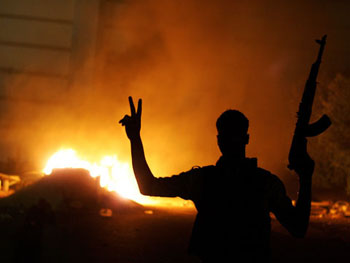Greg Sargent asked Tommy Vietor, who recently stepped down as the spokesman for the National Security Council, to provide his take on the whole Benghazi talking points affair. He got a long email in return in which Vietor admits some errors in how things were handled, but defends the NSC’s role in reconciling the various interests of different  agencies: “the fact that the government edited these points,” he says, “isn’t surprising or at all nefarious – it’s routine.” Plus this:
agencies: “the fact that the government edited these points,” he says, “isn’t surprising or at all nefarious – it’s routine.” Plus this:
One of the most frustrating parts of this discussion is the degree to which people now dismiss the impact of the Innocence of Muslims video. Our embassies in Cairo, Yemen and Sudan were attacked and seriously damaged. A western restaurant was torched in Lebanon. Dozens of countries experienced protests where scores of people died. Our troops in Afghanistan had to reduce their operational tempo and exposure as a preventative measure. Today, people act like the administration invented the issue. A 30-second scan of headlines from that week shows otherwise.
….Some allege that edits were made in an effort to downplay the role of al Qaeda or to try and sell a political narrative of rapidly normalizing ties with Libya. That’s just not true….The charge that there was an administration effort to “sell” a normalization narrative in Libya is nonsensical. There just isn’t a political angle here. No voter went to the polls thinking, I don’t like Obama, but boy we have a much better relationship with Tripoli now than we did a few years ago so he’s getting my vote. It’s just silly.
These two points can hardly be made strongly enough. There’s no question that the “Innocence of Muslims” video played a big role in outbreaks of violence across the Middle East during the week of September 11—including the protests in Cairo—and the CIA talking points suggested from the very beginning that the violence in Benghazi was “spontaneously inspired by the protests at the U.S. Embassy in Cairo.” So when Susan Rice suggested that the video had played a role in sparking the Benghazi attacks, she was repeating something that, at the time, was disputed by no one in the intelligence community. See Bob Somerby for more on this.
It’s also true that the entire alleged motivation for downplaying terrorism has never made any sense. Vietor is precisely correct when he says that although the Obama administration “talked about how al Qaeda core in Afghanistan and Pakistan had been decimated,” they were also very clear “that there was a growing threat from AQAP and other affiliates.” The idea that, somehow, downplaying the terror angle would help Obama’s election chances never made any sense from the start. It’s just partisan nitwittery.
Anyway, read the whole thing. Vietor’s take is interesting throughout.








